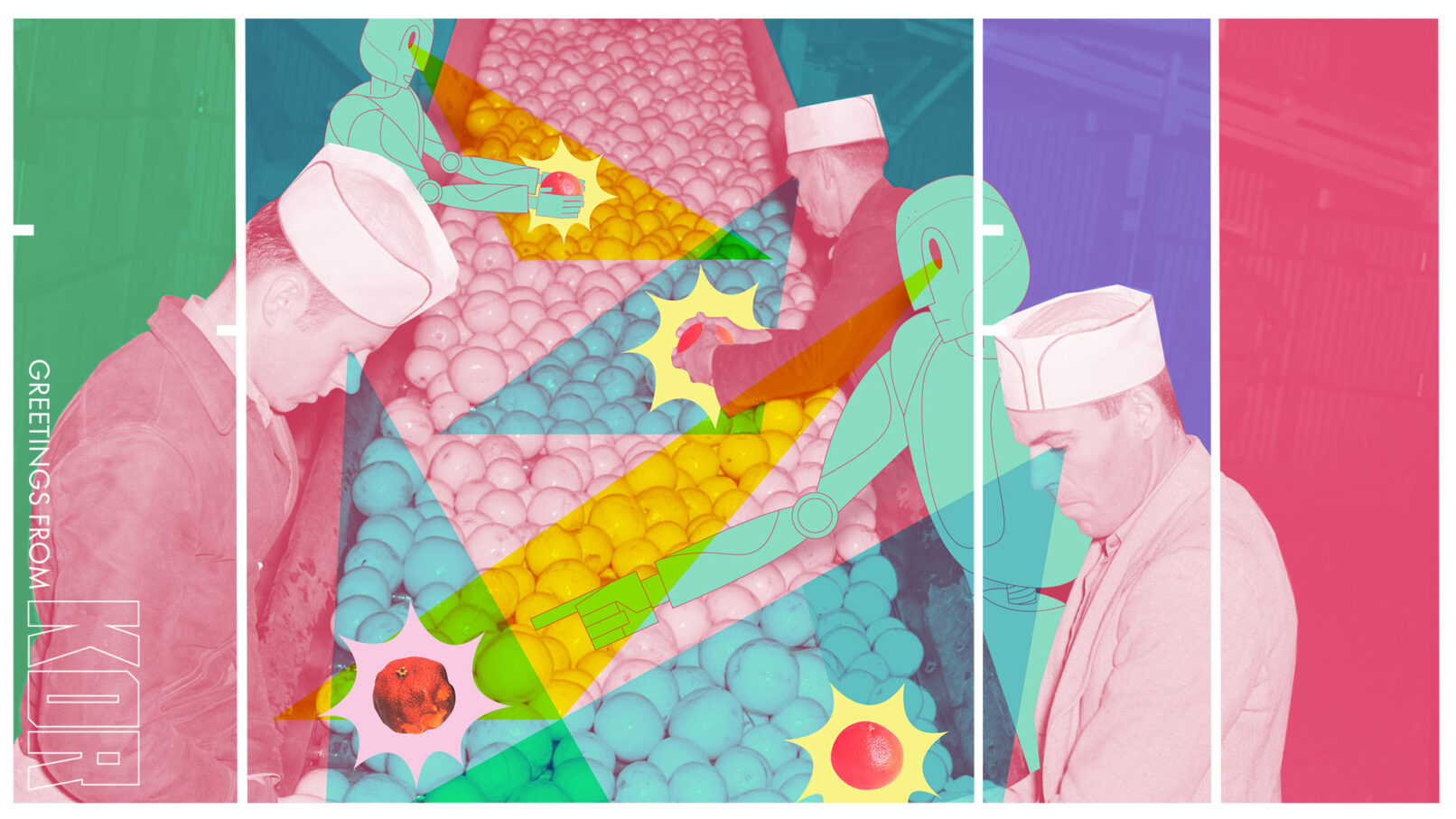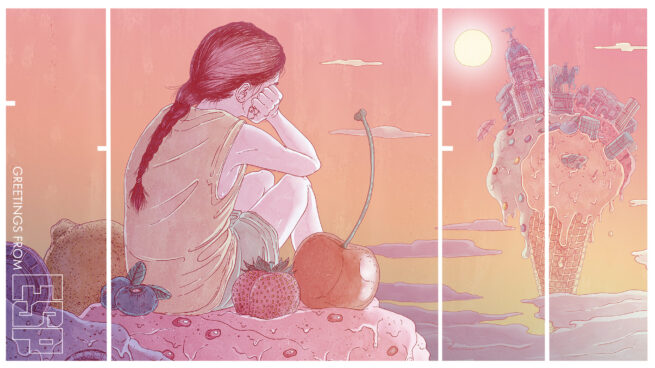You survived the high-speed train down south, which you hadn’t expected. Which means: There will be consequences. It means you’ll somehow have to find your way from the busy Gwangju train station, through the heart of the city and to the interview. Your first and only job interview. If you can manage to apply the cosmetics just purchased at a store past the platform and disguise your vampire pallor. If your trembling fingers can retie your straggly hair back in a forgiving ponytail. If you can somehow walk past the wall of crowds and stay intact across the vast square to the awaiting taxis. If you can manage the many steps and not lose your way. You will be forgiven.
The Confession
By Krys Lee
Slide into a taxi, clutch the black passenger handle. Ahn Robotics please, you say. You made it, you finally made it. At first, Gwangju through the window is still the city you remember. It is still surrounded by mountains, still a city of drab apartment blocks, still dotted with open markets and omnipresent public memorials to the Gwangju Massacre that defines your hometown. The same politicians in their dead-animal toupees and stage make-up still visit and give clichéd speeches on TV.
Press your face against the glass and look for your family’s favorite spicy rice cake shop, but a hipster café has replaced it. The city’s new solar pavements drink in the heat of the southern sun. You’d heard that the middle schools even have new science and design labs of glass and light. Pass innumerable white walls of complexes with windows facing the courtyard. This part of the city, your city, has become a series of blank white faces.
Your hometown obsessed with the past is finally looking to the future, and maybe that’s a good thing. The same politicians had thrown government money at Gwangju, bought their votes the way they bought everything, and accidentally created a terrain of laboratories conducting hushed research experiments that none of the old-timers would understand. They have also accidentally drawn you out of your family’s apartment.
At the stoplight the taxi driver turns to you and says, I’m going to tell you what’s really going on in Gwangju. You lean forward eagerly.
They’re taking over our city. Walk into a store and good luck finding a person to help you! The robots are everywhere, they’re serving pizza, taking orders, and the real people stay inside those white buildings before sunrise with their robots and leave after dark. In my day it was about people. Take my advice: It’s no way for a woman to live.
The old man looks as if he expects you to flee to the train station so you can look for more suitable women’s work.
But it’s a good life for a man? you ask. The words croak out of you, for it’s been a long time since you’ve spoken full sentences.
He gives you that oh-you’re-one-of-those looks through the rearview mirror. Don’t let him ruin this special day. You even showered.
Play the reclusive genius. Pretend you belong.
At the entrance that shivers like a silvery membrane, your biometrics are measured and your identity is authenticated. Your shoes and leather backpack are placed on a carousel and inspected for betrayals. Apparently even your shoes are dangerous.
In the vast white atrium spiraling upward like a snail shell, you wait with eleven other uncertain hopefuls until a woman in a gray sweater dress strides to your group who are busy assessing one another. You’re well-disguised in a two-piece suit and thick, fierce penciled-in eyebrows. How normal you look surprises you. How could the past six years of solitude not change your face?
She bows and says, I’ll be your guide for today in a voice paced too smoothly to be human. You recognize her robot awkwardness that matches your own strangeness. In the fierce debates on just how human to make robots, the too-human-is-too-dangerous side seems to be winning.
The company’s signature robot projects offer your group Boseong green tea and make slapstick jokes. Your favorite looks as if it stepped out of a K-pop music video. You can’t help but feel that the people are diminished by them. The word robot seems inadequate; they are more like other living creatures. Do they wonder what it’s like to be outside? Do they gaze at the camellia trees and the coarse green lawn and yearn?
During the tour of laboratories, showrooms, impressive demonstrations, you excuse yourself and try to sneak from the bathroom to the glass showrooms recessed into the first floor’s walls. You want a better look, but are immediately escorted back into the human net by a red-headed robot. It’s a little daunting, isn’t it? it says with a sassy smirk. Some are a little fearful of us, at first.
No, you say, people are the scary ones. It—or he? looks confused, then steps back into quiet. Into whatever robot thinking looks like.
You discover that the other 11 have graduate degrees from MIT, KAIST and Tokyo University. They belong to MENS, a membership that requires an IQ soaring above 140. Without question, you are the lone high school dropout. You wonder if your interview is an error. Or did one of their robots pull a prank and swap your ID for someone else’s? You wonder, finally, if you were brought in for dramatic contrast.
Play the reclusive genius. Pretend you belong. For you were not always so estranged from others. For employment just might be the key out of your lonely room. People do win lotteries after all. You haven’t been evil or cruel. And you know your computer languages, have hacked your way into many a site, including the hacking required to complete the application for today’s interview. You aren’t completely undeserving.
Team presentations follow. Your words form so slowly that it takes all your effort to string facts together to explain a technical puzzle. But you breeze through the coding test, the creativity tests. You begin to hope that you might, you just might pull it off.
No, you say, people are the scary ones.
By the time of the final interview with the board of directors, you want to redo the building’s bare-faced white walls in orange Andy Warhol flowers. Wiggle back into your familiar pajamas back home. Notice the others eyeing you as if you are their most threatening competitor. Silence really does work. You are mysterious and lethal, a potential resume of unknown achievements, and they are suspicious that you may be the pinnacle of this pyramid of capital. It makes you sick. You will be ranked by people who don’t know you, who will inspect you as if you were a grapefruit and determine whether you will go for full price or a discount. You will do your utmost to be the grapefruits of grapefruits, and this makes you ashamed of yourself.
Finally your name is called. You wish you could sit with your legs sprawled wide open, a cigarette hanging from your mouth like you don’t care. Tell the board you don’t want a job with them, or anyone. That you refuse to say yes.. Instead, you wait meekly with your legs crossed for the first question.
The board is older (no surprise), conservatively dressed (no surprise) and is 80 percent men. You feel gratified for the two women scientists present though you’re aware that statistically, women are harder on women than men.
The group looks severely at you without a single smile of light. Their legs, crossed in the same direction, present an intimidating barricade. The room smells like freshly ground coffee; underneath one of the director’s folders (one with your name on it, you’re sure) is a folded-up newspaper. You wonder if the world will ever be the same. Your mouth feels dry, your hands slick. They could be an execution crew. They could pull guns out of their white lab pockets and aim them impersonally at you. They would be helping your family that way.
How do you imagine contributing? one of them asks. What does it mean, to contribute? You stare at their polished shoes then at your heels that were once perfect yesterday, but one now has a wedge of chipped leather hanging like the tip of a cow’s tongue. When did this happen? This is who you’ve become. On the train ride back you’ll probably lose your backpack or be robbed.
What do you consider some of the greatest challenges facing the AI sector nationally? Globally? How will you confront it? Are you a team player? What’s your impression of the company? List in priority: originality, integrity, responsibility, and explain why. And finally: Tell us about you, your story, the one we can’t know on paper. A question you hadn’t prepped for.
What is your story is like asking: What is your passion? What is your sunrise?
Your legs shudder underneath you. You open your mouth. Tell them…tell them… You are more Mark Rothko than Jackson Pollock. A stupid thing to say. Clear your throat. Start again. Tell them your father is in the military so you grew up with a sense of responsibility and discipline. Intend to add that your father’s job required yearly moves from city to country so you excel at adapting, but instead discover yourself saying that after so many attempts to start over and make friends, you finally gave up. Say you declared yourself a conscientious objector to mandatory education, and as soon as the state gave you a choice you stopped going. That you stopped doing many things, like going for walks. Meeting the few new friends you’d made. Washing your matted, earthy hair. They are staring at you, but they are listening. Once you start speaking you can’t stop. Tell them the truth because you no longer have hope. That each time your older brother or mom told you, You look like an animal, you fled like an animal. Tell them that your younger brother faithfully borrowed books every week from the library, and you read around three hundred books a year. That what you have left are books and your online communities. That for the last three years your mom had left you a tray at your door, that speaking to family equaled arguments. That outside of moving day, you had not been outside for almost six years. Tell them you have become afraid of people. Tell them you want the job, that you need the job. That for too long you have felt like an other living creature. Tell them, tell anyone, that you want to remember what it was like, to be human.
Krys Lee is the author of the story collection Drifting House and the novel How I Became a North Korean, and the translator of I Hear Your Voice and the story collection Diary of a Murderer by Young-ha Kim. She has won the Rome Prize in Literature and the Story Prize Spotlight Award, the Honor Title in Adult Fiction Literature from the Asian/Pacific American Libraries Association, and was a finalist for the Center for Fiction First Novel Prize and the BBC International Story Prize. She currently teaches creative writing at Yonsei University, Underwood International College in Seoul, South Korea.
Eden Brackenbury is a designer and producer from Indiana, based in Brighton. She makes illustrations and animations for Storythings and our clients and looks after our websites and freelancers. She was the lead designer on Nevertheless Season 2, Public Media Stack and History of Drag.



